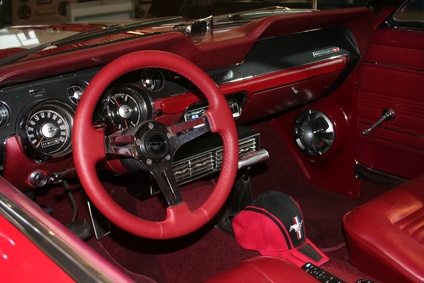
There are a lot of variables that affect noises that emanate, or seem to emanate, from your car's steering wheel. Most noises occur when turning the wheel. Car make and model is a factor, as is the type of steering system you have. Older cars may not have power steering, so you can eliminate possible power steering fluid issues. Newer cars and trucks almost always are equipped with power-assisted systems, whether it's rack-and-pinion or recirculating-ball steering. Your steering system interacts with many other parts, especially your suspension system, but most noises originating from steering maneuvers can be isolated and diagnosed.
Turn on your engine and turn the steering wheel. Listen to the noise and note where in the wheel's turning ratio you hear the sound---when you start to turn, at either or both extremes of the turn, or always. Also note whether you need to be moving for the sound to occur (probably if you're hearing a "clunk").
Identify the type of sound you're hearing. This can be tricky, but anyone who's run low on power-steering fluid, had a loose or worn belt, or run into suspension problems can differentiate between noises. Mechanics might ask you if you're hearing a squealing sound, a groan, a whine, a screech, or a clunking sound (clunking is definitely the worst sound you want to hear when turning your wheel). Usually you can describe the noise sufficiently enough to make a preliminary diagnosis.
Check your power steering pump belt if you hear a whining sound. Tighten or replace it if that's the problem. If the noise is occurring only at the extreme ends of the wheel turns, and the belt seems fine, you may be okay. Screeching can simply indicate you're trying too forcefully to turn past the steering system's capability.
Inspect your power steering fluid level if you hear a squeal. The pump actually is pumping more air than oil. Most fluid reservoir dipsticks have two level markers---one indicates the cold engine level, the other is the running engine level. Older cars have one mark for hot engine level only. Fill your reservoir with manufacturer-specified fluid (or have your oil-change service station do it). With a very low fluid level, the whining sound will be accompanied by a difficulty in turning the wheel.
Look at the pump itself when a screech is heard. A worn pump can produce incredibly awful noises even with sufficient fluid levels. It may have to be replaced.
Check your suspension system if you're experiencing a clunking sound while turning the wheel, especially when the car is moving. You also may hear the sound when braking or traveling over bumps, and the wheel may vibrate. The possible problems are numerous, but none will be as simple to fix as pouring in a little fluid. Inspect your shocks, struts and other suspension-related parts. This can be a dangerous condition. Don't attempt to drive. Have your vehicle towed to a service station.